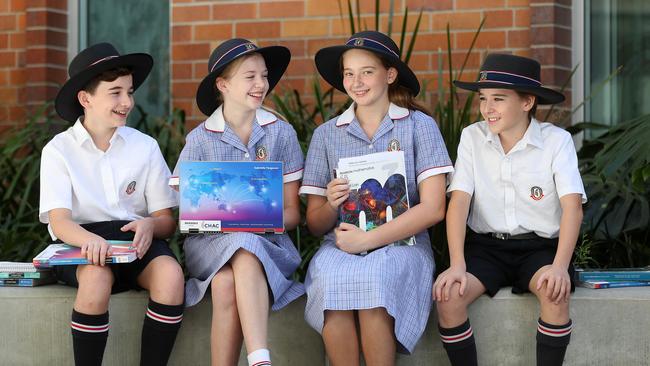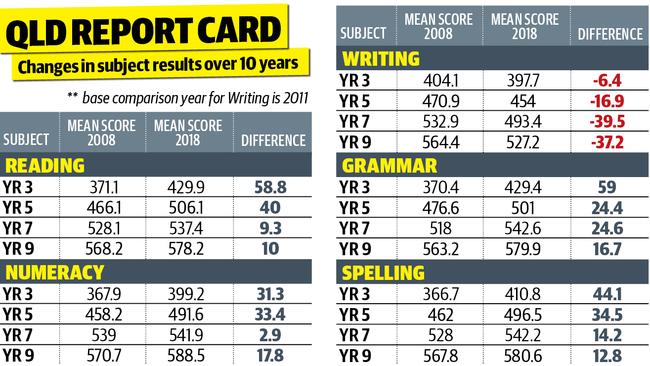A decade of NAPLAN tests shows how our schools have changed
Ten years after the introduction of NAPLAN, Queensland students have recorded strong improvements in reading, grammar and spelling. But there’s one area in which the scores have gone backwards at every year level.
QLD News
Don't miss out on the headlines from QLD News. Followed categories will be added to My News.
A DECADE on from the introduction of NAPLAN, Queensland can boast rapid improvements in almost every key subject.
Today the final 2018 NAPLAN report is released, and showed the Sunshine State has seen strong improvements across multiple areas and age groups since the testing began in 2008.
Scores for Years 3 and 5 students have seen the strongest improvements in the past decade, particularly in reading, grammar, and spelling.
STATE’S TOP NAPLAN SCHOOLS REVEALED
NAPLAN RESULTS: PUBLIC V PRIVATE
But instead of being on the up, Queensland’s writing scores have instead gone backwards at every year level.
NAPLAN Review: schools accused of suggesting kids skip tests
Queensland’s best and worst school attendance records revealed
Kids have more power than ever to pick their school
Writing scores among school kids were not just a concern in Queensland but the nation, the report showed, with 2018’s results across the country the lowest overall since tests began.
An often controversial standardised testing method, NAPLAN was recently the subject of a comprehensive review in Queensland which was released by Education Minister Grace Grace late last month.

Minister Grace said the review, which the input of more than 7500 parents and carers, 3000 students and 6000 teachers, principals and education stakeholders, found both pros and cons to the testing method.
“It identified that NAPLAN had played a role in supporting improvements in Queensland’s educational outcomes,” she said.
“However, many parents reported that testing caused their child to experience anxiety and stress, that there were a range of unintended consequences stemming from the now high-stakes nature of the testing, and that there were differing expectations about the purpose of NAPLAN.”
Minister Grace said she would continue to advocate for a national review of NAPLAN, which is in a transition period of moving to an online test.

She also noted The Grattan Institute report card released late last year on the 2018 NAPLAN results, which commended Queensland for its lifting of teacher standards, and focus on improving literacy and numeracy standards across the state in the past decade.
“This improvement shows that our record investment and continued focus on education is reaping rewards”, she said.
The Australian Curriculum, Assessment and Reporting Authority said in the report released today Queensland had seen a substantial increase in reading achievement, with the highest increase in mean score of all the states and territories.
The percentages of students who performed at or above the national minimum standard also improved the most of all states, up nine points.
ACARA chief executive David de Carvalho said it was clear there had been a strong focus on the “building block” primary school years from the decade of results.
“As students move into secondary school, their level of engagement can drop,” he said.
“That’s a challenge for all of us involved in education to think about how we can keep young people engaged, right up until the end of Year 12.”
This year’s NAPLAN testing will take place from May 14-16.


